一般现在时用法及练习题
(完整版)大学一般现在时讲解及练习题
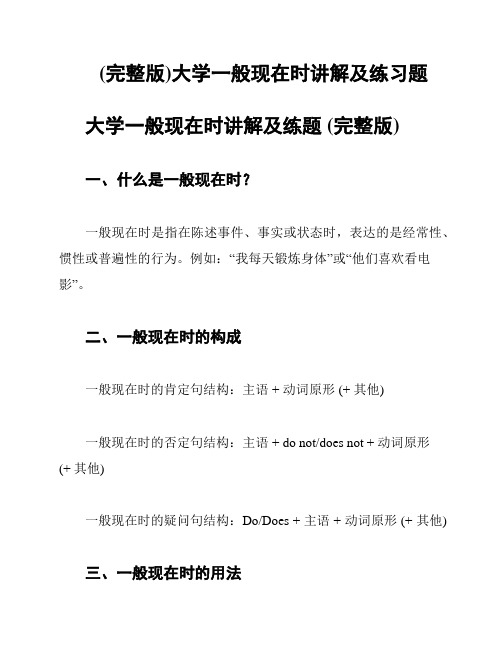
(完整版)大学一般现在时讲解及练习题大学一般现在时讲解及练题 (完整版)一、什么是一般现在时?一般现在时是指在陈述事件、事实或状态时,表达的是经常性、惯性或普遍性的行为。
例如:“我每天锻炼身体”或“他们喜欢看电影”。
二、一般现在时的构成一般现在时的肯定句结构:主语 + 动词原形 (+ 其他)一般现在时的否定句结构:主语 + do not/does not + 动词原形(+ 其他)一般现在时的疑问句结构:Do/Does + 主语 + 动词原形 (+ 其他)三、一般现在时的用法1. 表示客观事实、真理或普遍现象,常常与表示频率的副词一起使用。
例如:“水烧开时会冒泡”。
2. 表示经常性或惯性的行为。
例如:“我每天都喝咖啡”。
3. 表示现阶段的情况或状态。
例如:“我现在住在中国”。
4. 在叙述历史事件或小说情节时,使用一般现在时可以增加紧迫感和现场感。
例如:“他打开门,走进了房间”。
四、一般现在时的练题1. 填入适当的动词形式:- She ____(have) two cats.- They ____(go) to school every day.- My father ____(work) as a doctor.2. 句子改为否定句:- I eat breakfast every morning.- She likes to read books.- We play tennis on weekends.3. 根据题意回答问题:- When do you usually go to bed? - Does he watch TV every evening? - How often does she go shopping?4. 将下列句子改为一般疑问句:- You live in London.- They play football in the park.- She enjoys dancing.五、答案1. 填入适当的动词形式:- She has two cats.has two cats.- They go to school every day.go to school every day. - My father works as a doctor.works as a doctor.2. 句子改为否定句:- I do not eat breakfast every morning.- She does not like to read books.- We do not play tennis on weekends.3. 根据题意回答问题:- I usually go to bed at 11 PM.- Yes, he watches TV every evening.- She goes shopping once a week.4. 将下列句子改为一般疑问句:- Do you live in London?- Do they play football in the park?- Does she enjoy dancing.希望以上内容对你理解和练一般现在时有所帮助!如有任何问题,请随时向我提问。
英语一般现在时答题技巧及练习题(含答案)及解析
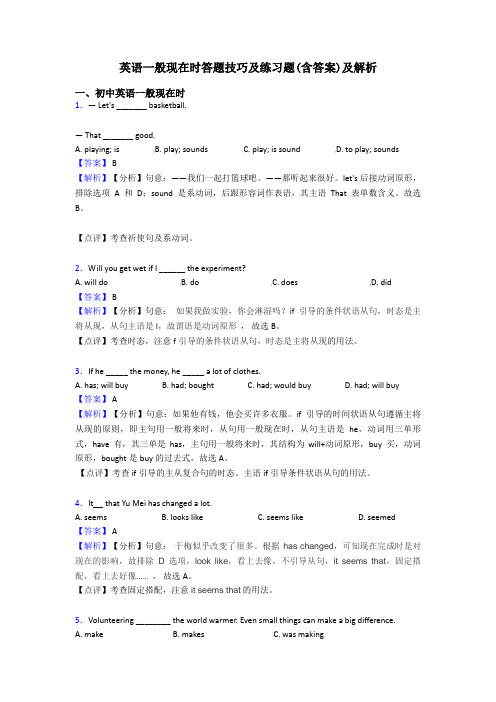
英语一般现在时答题技巧及练习题(含答案)及解析一、初中英语一般现在时1.— Let's _______ basketball.— That _______ good.A. playing; isB. play; soundsC. play; is soundD. to play; sounds【答案】 B【解析】【分析】句意:——我们一起打篮球吧。
——那听起来很好。
let's后接动词原形,排除选项A和D;sound是系动词,后跟形容词作表语,其主语That表单数含义。
故选B。
【点评】考查祈使句及系动词。
2.Will you get wet if I ______ the experiment?A. will doB. doC. doesD. did【答案】 B【解析】【分析】句意:如果我做实验,你会淋湿吗?if引导的条件状语从句,时态是主将从现,从句主语是 I,故谓语是动词原形,故选B。
【点评】考查时态,注意f引导的条件状语从句,时态是主将从现的用法。
3.If he _____ the money, he _____ a lot of clothes.A. has; will buyB. had; boughtC. had; would buyD. had; will buy【答案】 A【解析】【分析】句意:如果他有钱,他会买许多衣服。
if引导的时间状语从句遵循主将从现的原则,即主句用一般将来时,从句用一般现在时,从句主语是he,动词用三单形式,have有,其三单是has,主句用一般将来时,其结构为will+动词原形,buy买,动词原形,bought是buy的过去式,故选A。
【点评】考查if引导的主从复合句的时态。
主语if引导条件状语从句的用法。
4.It that Yu Mei has changed a lot.A. seemsB. looks likeC. seems likeD. seemed【答案】 A【解析】【分析】句意:于梅似乎改变了很多。
一般现在时用法及专项练习

一般现在时(the simple present tense)一、定义是一种英语语法形式,表示规律性、通常性、习惯性、真理性的动作或状态。
二、结构(一)肯定句1. 主语 + be 动词(am/is/are)+ 其他。
例如:I am a student.(我是一名学生。
)2. 主语 + 动词原形。
例如:We play basketball on weekends.(我们在周末打篮球。
)3.主语(第三人称单数)+动词第三人称单数形式。
一般在动词词尾加 -s 或 -es。
例如:He plays football after school.(他放学后踢足球。
)Tom usually goes to school at 7:30.(汤姆通常7点半去学校。
)(二)否定句1. 主语 + be 动词(am/is/are)not +其他。
例如:I am not a student.(我不是一名学生。
)2. 主语 + do not(don’t) +动词原形。
例如:We do not play basketball on weekends.(我们周末不打篮球。
)3.主语(第三人称单数)does not(doesn’t )+动词原形。
例如:He does not play football after school.(他放学后不踢足球。
)(三)一般疑问句1. Be动词+主语+其他?例如:Is she a student?(她是学生吗?)2. Do/Does + 主语 + 动词原形?例如:Do you play football after school? (你放学后踢足球吗?)Does he work here? (他在这里工作吗?)三、用法1. 描述习惯或重复动作:常与表示频率的时间状语连用。
例如:I get up at 6 o'clock every morning. (我每天早上六点起床。
)He goes to school by bus. (他乘公共汽车上学。
一般现在时练习题及答案
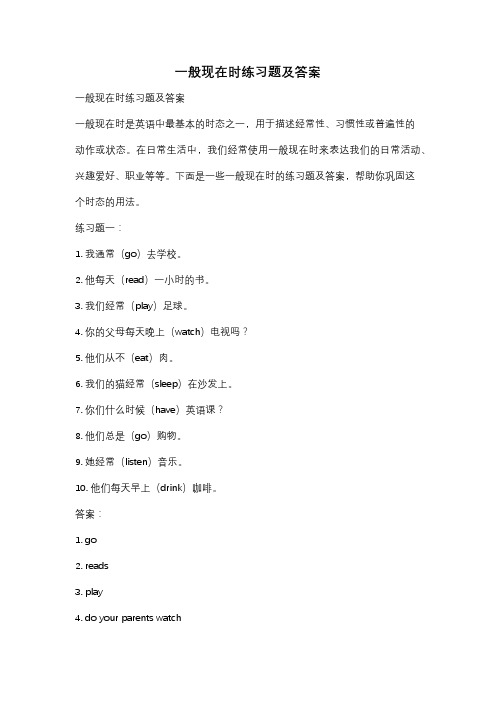
一般现在时练习题及答案一般现在时练习题及答案一般现在时是英语中最基本的时态之一,用于描述经常性、习惯性或普遍性的动作或状态。
在日常生活中,我们经常使用一般现在时来表达我们的日常活动、兴趣爱好、职业等等。
下面是一些一般现在时的练习题及答案,帮助你巩固这个时态的用法。
练习题一:1. 我通常(go)去学校。
2. 他每天(read)一小时的书。
3. 我们经常(play)足球。
4. 你的父母每天晚上(watch)电视吗?5. 他们从不(eat)肉。
6. 我们的猫经常(sleep)在沙发上。
7. 你们什么时候(have)英语课?8. 他们总是(go)购物。
9. 她经常(listen)音乐。
10. 他们每天早上(drink)咖啡。
答案:1. go2. reads3. play4. do your parents watch5. eat6. sleeps7. do you have8. go9. listens to10. do they drink练习题二:1. 你通常几点起床?2. 他们每周末去哪里?3. 你的朋友们喜欢什么运动?4. 你们的狗喜欢吃什么食物?5. 他们多久去一次健身房?6. 你们的邻居是干什么的?7. 你每天晚上做什么?8. 他们有多少个孩子?9. 你喜欢什么颜色?10. 他们通常什么时候吃晚饭?答案:1. What time do you usually get up?2. Where do they go on weekends?3. What sports do your friends like?4. What food does your dog like?5. How often do they go to the gym?6. What do your neighbors do?7. What do you do every evening?8. How many children do they have?9. What color do you like?10. When do they usually have dinner? 练习题三:1. 我们经常(go)购物。
【英语】一般现在时知识点总结及经典习题(含答案)
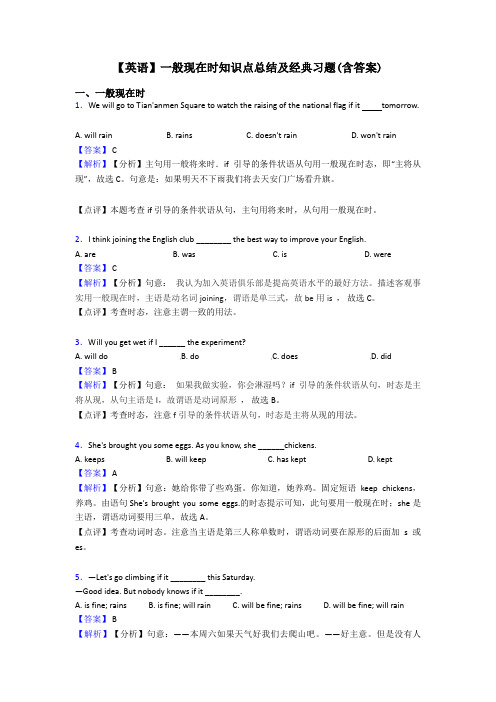
【英语】一般现在时知识点总结及经典习题(含答案)一、一般现在时1.We will go to Tian'anmen Square to watch the raising of the national flag if it tomorrow.A. will rainB. rainsC. doesn't rainD. won't rain【答案】 C【解析】【分析】主句用一般将来时.if引导的条件状语从句用一般现在时态,即“主将从现”,故选C。
句意是:如果明天不下雨我们将去天安门广场看升旗。
【点评】本题考查if 引导的条件状语从句,主句用将来时,从句用一般现在时。
2.I think joining the English club ________ the best way to improve your English.A. areB. wasC. isD. were【答案】 C【解析】【分析】句意:我认为加入英语俱乐部是提高英语水平的最好方法。
描述客观事实用一般现在时,主语是动名词joining,谓语是单三式,故be用is,故选C。
【点评】考查时态,注意主谓一致的用法。
3.Will you get wet if I ______ the experiment?A. will doB. doC. doesD. did【答案】 B【解析】【分析】句意:如果我做实验,你会淋湿吗?if引导的条件状语从句,时态是主将从现,从句主语是 I,故谓语是动词原形,故选B。
【点评】考查时态,注意f引导的条件状语从句,时态是主将从现的用法。
4.She's brought you some eggs. As you know, she ______chickens.A. keepsB. will keepC. has keptD. kept【答案】 A【解析】【分析】句意:她给你带了些鸡蛋。
小升初英语动词一般现在时用法单选题40题
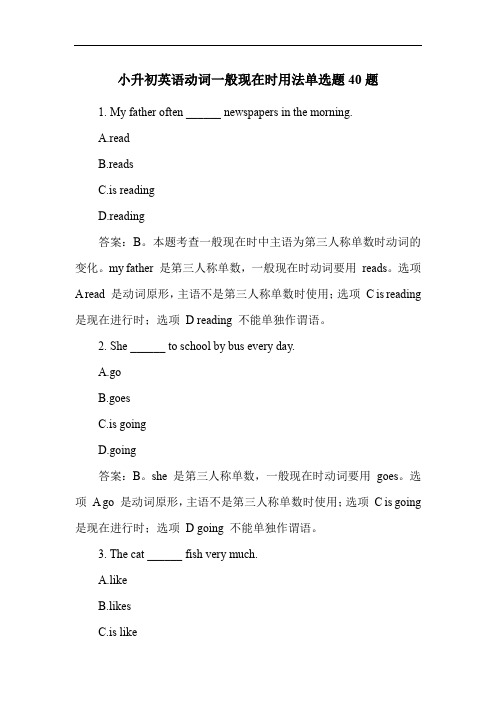
小升初英语动词一般现在时用法单选题40题1. My father often ______ newspapers in the morning.A.readB.readsC.is readingD.reading答案:B。
本题考查一般现在时中主语为第三人称单数时动词的变化。
my father 是第三人称单数,一般现在时动词要用reads。
选项A read 是动词原形,主语不是第三人称单数时使用;选项C is reading 是现在进行时;选项D reading 不能单独作谓语。
2. She ______ to school by bus every day.A.goB.goesC.is goingD.going答案:B。
she 是第三人称单数,一般现在时动词要用goes。
选项 A go 是动词原形,主语不是第三人称单数时使用;选项C is going 是现在进行时;选项D going 不能单独作谓语。
3. The cat ______ fish very much.A.likeB.likesC.is likeD.liking答案:B。
the cat 是第三人称单数,一般现在时动词要用likes。
选项 A like 是动词原形,主语不是第三人称单数时使用;选项C is like 表示“像……”;选项D liking 不能单独作谓语。
4. My sister ______ her homework after school.A.doB.doesC.is doingD.doing答案:B。
my sister 是第三人称单数,一般现在时动词要用does。
选项 A do 是动词原形,主语不是第三人称单数时使用;选项 C is doing 是现在进行时;选项D doing 不能单独作谓语。
5. He ______ football on weekends.A.playB.playsC.is playingD.playing答案:B。
大二一般现在时练习40题
大二一般现在时练习40题1. Tom often ______ football with his friends on weekends.A. playB. playsC. playingD. played答案:B。
本题考查一般现在时中主语为第三人称单数时动词的变化规则。
Tom 是第三人称单数,一般现在时中,动词要用第三人称单数形式,play 的第三人称单数形式是plays。
选项A 是动词原形,选项 C 是现在分词,选项 D 是过去式,都不符合一般现在时中主语为第三人称单数的用法。
2. Mary ______ her homework carefully every day.A. doB. doesC. doingD. did答案:B。
Mary 是第三人称单数,在一般现在时中,其后的动词要用第三人称单数形式,do 的第三人称单数形式是does。
选项A 是动词原形,选项C 是现在分词,选项D 是过去式,均不符合要求。
3. The teacher ______ us a lot of questions in class.A. askB. asksC. askingD. asked答案:B。
The teacher 是第三人称单数,一般现在时中动词要用第三人称单数形式,ask 的第三人称单数形式是asks。
选项 A 是动词原形,选项C 是现在分词,选项D 是过去式,都不正确。
4. Jack ______ to the library three times a week.A. goB. goesC. goingD. went答案:B。
Jack 是第三人称单数,一般现在时中,其后的动词要用第三人称单数形式,go 的第三人称单数形式是goes。
选项 A 是动词原形,选项C 是现在分词,选项D 是过去式,不符合语法规则。
5. My sister ______ English very well.A. speakB. speaksC. speakingD. spoke答案:B。
小学生一般现在时讲解及练习题
小学生一般现在时讲解及练习题一、一般现在时的用法一般现在时表示经常性的动作、惯、事实或真理。
以下是一般现在时的用法:1. 表示经常性的动作或惯- She brushes her teeth every morning.(她每天早上刷牙。
)- They always go for a walk in the park.(他们总是去公园散步。
)2. 表示普遍真理或事实- The Earth revolves around the Sun.(地球绕着太阳转。
)- Water boils at 100 degrees Celsius.(水在100摄氏度沸腾。
)3. 表示瞬间事件或现况- I love ice cream.(我喜欢冰淇淋。
)- The dog barks loudly.(狗叫得很大声。
)二、一般现在时的构成在一般现在时中,动词的变化相对简单。
1. 对于第三人称单数(He/She/It),动词要加-s或-es。
- He walks to school every day.(他每天走路去学校。
)- She eats an apple.(她吃一个苹果。
)- It runs fast.(它跑得很快。
)2. 对于其他人称(I/You/We/They),动词不变。
- I play soccer on weekends.(我周末踢足球。
)- You read books every night.(你每晚读书。
)- We go swimming in summer.(我们夏天去游泳。
)- They watch movies together.(他们一起看电影。
)三、练题请根据句意填入正确的动词形式。
1. My mother __________ (cook) dinner for us every evening.2. Tom and Lisa __________ (play) tennis on Saturdays.3. The sun __________ (rise) in the east.4. We __________ (study) English at school.5. Dogs __________ (bark) when they see strangers.1. cooks2. play3. rises4. study5. bark希望以上讲解和练习题对你有帮助!。
一般现在时讲解及练习题
欢迎下载一般现在时讲解及练习题一般现在时①表示现在的状态,如:She is ten. Kate is in the classroom. ②表示经常发生或习惯性的动作或状态,如:We often call to each other.我们时常相互通信。
③表示主语现在的性格、特征、能力,如: I like English. We can speak English.I.当谓语动词是be 时谓语动词be 包括am,is ,are.其用法是:我(I )用am; 你(you )用 are; is 用于他(him )她(her )它(it );复 数人称都用are.主要句式:1 .肯定句式 主语+be(am,are,is) +其他。
2 .否定句式 主语+be(am,are,is)+not +其他。
3 .一般疑问句 将提前be(am,are,is), 即:Be(am,are,is) + 主语 + 其他?肯定回答Yes,主语(必须是代词)+be (am,are,is )否定回答No,主语(必须是代词)+be(am,are,is )+not (必须用缩写形式isn't/aren't )闯关练习I.用be 的适当形式填空欢迎下载 精品资 精品资1.---How you? ---I fine.2.I David,and my family name Green.3.---What color your clock? ---It white.4.---What this in English?---It an apple.5.Toy my brother.David mybrother,too.They my brothers.6.Look!These apple trees.7.We good students and you good teacher.8.My sister and my brother students.9.Five and three eight.10.your card number 5578?11.Where your pencils?12.These sweaters fifty dollars.13.How much his jacket?14.My brother,s birthday December 11th.15.When Kate,s birthday?II.将下面的句子变成一般疑问句并作出回答1.That is my football.2.Those are his books.3.Jim and Tom are good friends.4.My birthday is November 1st.欢迎下载精品资5.His son is twelve years old.111.将下面的句子变成否定句1.His card is on the table.2.There is some water in the bottle.3.Bob and Tony are our friends.4.There are thirty-five students in the classroom.5.The girl is his sister.II.当谓语动词是实义动词时1.当主语是第一人称(I \ we );第二人称(you)及复数时主要句式:(1)肯定句主语+实义动词+其他(2)否定句主语+don’t+实义动词+其他(3)一般疑问句Do+主语+实义动词+其他肯定回答:Yes,主语(必须是人称代词)+do. 否定回答:No,主语(必须是人称代词)+don’t.2.当主语是第三人称单数he, she, it及单数的名词时,主要句式:(1)肯定句:主语+实义动词的第三人称单数形式+其他一(2)否定句:主语+doesn’t+实义动词的原形+ 其他一欢迎下载精品资(3)一般疑问句Does +主语+实义动词的原形+其他肯定回答:Yes,主语(必须是人称代词)+does否定回答:No,主语(必须是人称代词)+doesn’t 动词第三人称单数形式变化规则:特殊变化have----has一、一般情况加s,例如:looks, likes, wants, plays,二、以ch, sh, s, x或o结尾的词,加-es,例如:teaches, washes, guesses, goes, does三、辅音字母+y结尾,变y为i力口-es,例如:carr yf carries, stud y f studies闯关练习I/将下面的句子变成一般疑问句并作出回答1.1h ave a baseball.2.Meria likes apples very much.3.He plays Ping-pang every day.4.We watch TV in the evening.5.Mr Wang often buys lots of things.6. Jane and Mary go to school at 7:30.II.将下面的句子变成否定句1.1n eed a bag for sport.2.He wants to go to a movie.3.She often goes to see Beijing Opera.欢迎下载精品资4.The girl has an egg for breakfast.5.We play basketball every day.6.My teacher knows my name.7.It sounds very interesting.IV.用所给词的适当形式填至1. her sister(have) a tennis racket?2.your friend(like) basketball?3.We(play) football every day.4.It(sound) very well.5.Jim(want) an orange.7.My mother(watch)TV in the evening.8. you(like) English?9. Mike and Li Lei(not like) eggs.10.What color your sister(like)?11. She(know) a little English.改写句子1.Do you often play football after school?(肯定回答)2.I have many books.(改为否定句)3.Gao Shan's sister likes playing tab改为否定句)欢迎下载4. She lives in a small town near New York. 疑问句)5. I watch TV every day.(改为一般疑问句)6. David has a goal.(改为一般疑问句)7. We have four lessons.(否定句)8. Nancy doesn't run f 肯定句)9. My dog runs fast.否定句:10. Mike has two letters for him.一般疑问句:I usually play football on Friday afternoon.一般疑问句: 精品资 (改为一般。
初中语法重点:一般现在时的用法和练习详解附解析
初中重点语法:一般现在时第一部分:定义与详解第二部分:练习和语法解析一、定义与讲解一般现在时:表示经常性,习惯性的动作或状态。
时间状语:often 经常,usually通常,always 总是,every每个,sometimes 有时,never从不,seldom 极少结构:动词原形(第三人称单数+s/es)。
第三人称单数变化:(1)直接在动词词尾加-s.ask---asks work---works get---gets stay---stays(2)以字母s, x, ch, sh或o结尾的动词,在词尾直接加-es.watch---watches wish---wishesfix---fixes do---does go---goes pass---passes(3)以“辅音字母加- y”结尾的动词,要先变y为i再加-es.try---tries study---studies cry---cries fly---flies2.不规则变化:be---- is are have----has二、一般现在时用法图片1. 表示经常性,习惯性,永久性的动作或存在的状态。
通常与副词sometimes, often, usually, always, every day (year, month ), once (twice, three times) a day,等时间状语连用。
例:They usually go to school by bike.I take the medicine three times a day.She helps her mother once a week.Mary’s father is a policeman.There are 50 students in my class.2. 表示客观真理,科学原理,自然现象,等客观事实或格言,谚语等。
例:The sun rises in the east and sets in the west every day.Tomorrow is Tuesday.三、一般现在时的句型转换(1)当句子中有be动词或情态动词时,则把be动词或情态动词(can,could等等)提到主语的前面变成疑问句;在be动词或情态动词后面加not变成否定句.例:①陈述句:She is a student.疑问句→Is she a student?否定句→She is not a student.②陈述句:I can swim.疑问句→Can you swim?否定句→I can not swim.(2) 当句子中即没有be动词,也没有情态动词时,则在主语前加助动词do (you,以及复数), does(单数she,he,it)变成问句;在主语后谓语动词前加助动词don’t(I,you,以及复数), doesn’t(单数she,he,it)变成否定句,助动词后的动词要变成动词原形。
- 1、下载文档前请自行甄别文档内容的完整性,平台不提供额外的编辑、内容补充、找答案等附加服务。
- 2、"仅部分预览"的文档,不可在线预览部分如存在完整性等问题,可反馈申请退款(可完整预览的文档不适用该条件!)。
- 3、如文档侵犯您的权益,请联系客服反馈,我们会尽快为您处理(人工客服工作时间:9:00-18:30)。
一般现在时用法及练习题Hello, boys and girls.我是一般现在时,你们想知道我的故事吗?Let me tell you!首先,介绍我的本领。
我的本领有三样:1.表示事物或人物的特征、状态。
如:The sky is blue.天空是蓝色的。
2.表示经常性或习惯性的动作。
如:I get up at six every day.我每天六点起床。
3.表示客观现实。
如:The earth goes around the sun.地球绕着太阳转。
第二,请看我的面目--构成:1. be动词:主语+be(am ,is ,are)+其它。
如:I am a boy.我是一个男孩。
2.行为动词:主语+行为动词(+其它)。
如:We study English.我们学习英语。
当主语为第三人称单数(he, she ,it)时,三单变化:多数在动词后加s ,play—plays like—likes 以s,x,sh,ch,o结尾的动词加es go—goes wash—washes,以辅音字母加y结尾,把y改i再加es,fly—flies 。
第三,我的变化--否定句、一般疑问句、特殊疑问句:1. be动词的变化。
否定句:主语+ be + not +其它。
如:He is not a worker.他不是工人。
一般疑问句:Be +主语+其它。
如:-Are you a student? -Yes. I am. / No, I'm not.特殊疑问句:疑问词+一般疑问句。
如:Where is my bike?2.行为动词的变化。
否定句:主语+ don't( doesn't ) +动词原形(+其它)。
如:I don't like bread.当主语为第三人称单数时,要用doesn't构成否定句。
如:He doesn't often play.一般疑问句:Do( Does ) +主语+动词原形+其它。
如:- Do you often play football?- Yes, I do. / No, I don't.当主语为第三人称单数时,要用does构成一般疑问句。
如:- Does she go to work by bike?- Yes, she does. / No, she doesn't.特殊疑问句:疑问词+一般疑问句。
如:How does your father go to work?同学们需要掌握的一般现在时第三人称单数形式:Lives, teaches, goes, watches, reads, does, works, does, doesn’t。
小朋友们,下次见到我时,千万不要忘记我是"一般现在时"啊!See you next time!一般现在时练习I. Choose the right answers to cloze.用括号内适当的形式填空。
1.We often (play) in the playground.2. He (get) up at six o’clock.3. you (brush) your teeth every morning.4. What (do) he usually (do) after school?5. ______ they ________(like) the World Cup?6. Mike sometimes __________(go) to the park with his sister.7. At eight at night, she (watch) TV with his parents.8. Mike (read) English every day?9. How many lessons your classmate________(have) on Monday?10. What time his mother (do) the housework?11.He usually _____ (get)up at six in the morning.12.She______(have) blues eyes.13.We _______(go ) to school every day14.The boy _________(like) playing football.15.We_______(have)no classes on Sundays.16.She________(write) to her mother once a week.17.It _____(rain)quite often during the month of July every year.18.She often_________(watch)TV on Saturdays.19.Mike usually_________(ride) a bike with his friends in the park.20 Peter and Mary often_______(play) badminton together.23.My mother______(have) a lot of cousins.21.Many people often _______ (listen) to the radio in the moring.22.______(do)she _______(like) playing the violin?Yes,she______(do).23.She_____(have)four brothers. She______(like) them very much.24. He often ________(have) dinner at home.25. We _______(not watch) TV on Monday.26.Sandy usually _______(play) the piano on Sundays.27.The cat________(like) eating fish every much.28. Su Hai and Su Yang _______(have) eight lessons this term.29. She and I ________(take) a walk together every evening.II. Read and fill in the blanks.(选词填空)Watches read goes gets eats lives worksMy aunt is a nurse. She likes music very much. She ______ in a big hospital. Every day she ______ up at 6:30. She ______ breakfast at 7:00. After breakfast she ______ to work by bus. She usually goes home at 5:30. After dinner, she often ______ TV and ______ books. At 10:30, she goes to bed.III. Read the questions and circle the right answers.(读问题,圈出正确的答案)1.Where does your pen pal live?A. No, she live in the country.B. She live in the city.C. She lives in the city.2.When does she go to work?A. She go to work at 7.B. She goes to work at 7.C. Yes, she does.3. Does Peter go to school by subway?A. No, he does.B. No, he doesn’t.C. Yes, on foot.4. What does Miss Green do?A. She teaches English.B. Yes, she’s a teacher.C. At school.5.Does she read newspapers at night?A. Yes, she do.B. Yes, she does.C. No, she does. 6.What’s your pen pal’s hobby?A. She like reading.B. She like read.C. She likes reading.练习题及答案:1. - What about the pen you bought yesterday?- It _____ well. I like it very much.A. was writtenB. is writtenC. wroteD. writes2. There is going to _____ a sports meeting next week. If it _____, we'll have to cancel it.A. be; will rainB. have; will rainC. be; rains3. Tom is strong and he _____ to school every day.A. walkedB. walksC. will walkD. has walked4. - What will you do if it _____ tomorrow?- I'll stay at home and watch the match on TV.A. rainB. rainsC. will rainD. is raining5. Every year many foreigners _____ to China to learn Chinese.A. have comeB. comesC. cameD. come6. - I won't go to bed until the TV play _____ over.- You'd better not do that.A. isB. wasC. willD. will be7. A large number of students in this school _____ from the country. They work very hard.A. comeB. comesC. cameD. coming8. - I wonder if I _____ tomorrow.- Don't worry. If it_____, we'll stay at home.A. rains, rainsB. will rain, rainsC. rains, will rain9. - When will you come to see me, Dad?-I will go to see you when you _____ then training course.A. finishedB. finishC. are finishingD. will finish10. - What do you do?- I'm an engineer. I _____ in a company in Wuhan. I like my job very much.A. workB. had workedC. will workD. worked11. - How much _____ the shoes?- Five dollars _____ enough.A. is; isB. are; isC. are; areD. is; are12. I'll do it better if the teacher _____ me another chance.A. giveB. givesC. gaveD. will give13. In the coming summer holidays, my family _____ going to take a one-week trip to Qingdao.A. isB. areC. wasD. were14. The children will climb the hill if it _____ tomorrow.A. won't rainB. didn't rainC. doesn't rainD. isn't raining15. - When to the hospital?- When he _____ there. I'll call you.A. he goes; goesB. will he go; will goC. he go; will he goD. will he go; goes16. The teacher told us that light _____ much faster than sound.A. traveledB. will travelC. travelsD. is travelingl7. It_____ twelve hours to go to Guangzhou by train.A. is takingB. are going to takeC. takesD. has taken18. It _____ four years since my father-j _____ _____ .A. is。
